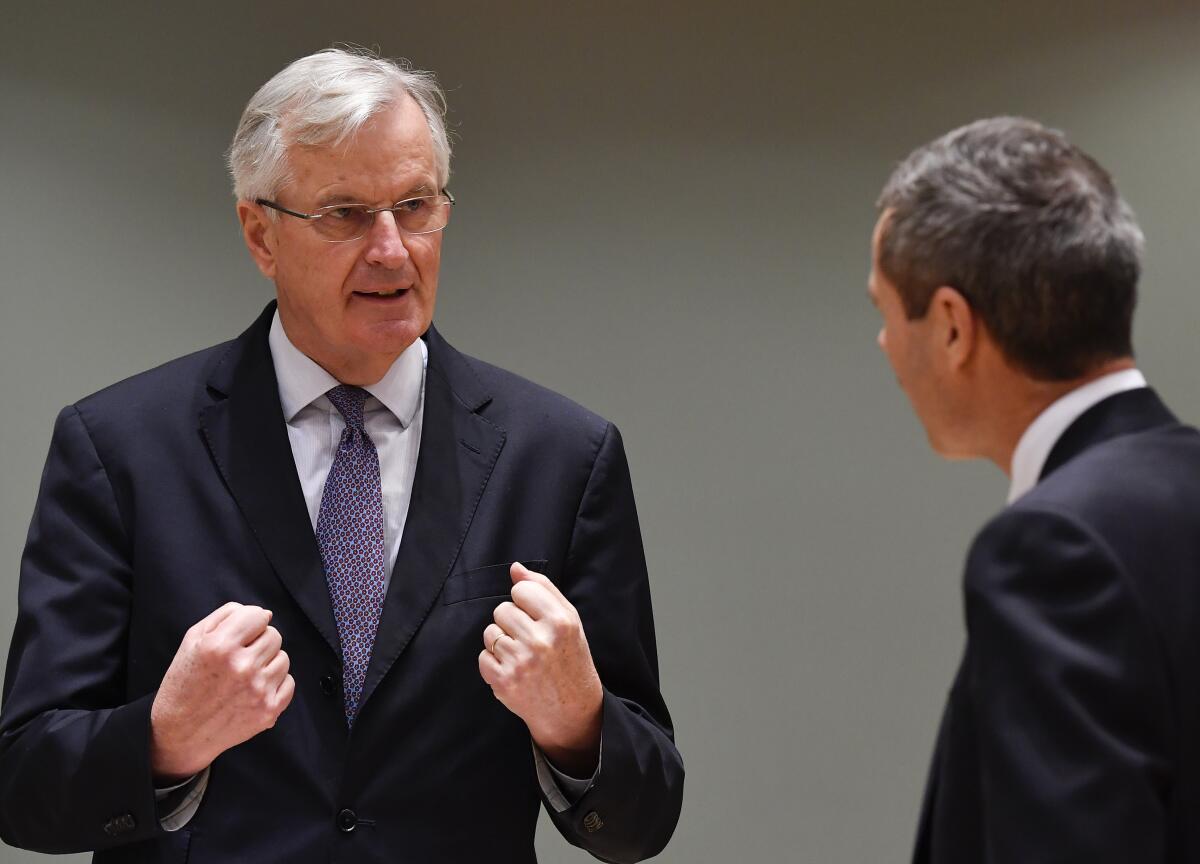EU and U.K. leaders seek way out of Brexit trade impasse

- Share via
BRUSSELS — The European Union and the United Kingdom kicked efforts into higher gear Tuesday to settle a fight over EU fishing quotas in British waters, the main obstacle to a trade deal that would avoid a chaotic New Year’s Day economic divorce between the two.
EU nations insisted that they would even consider negotiating beyond Jan. 1 if necessary, acknowledging that an agreement that would safeguard hundreds of thousands of jobs on both sides should not fall apart over the small fisheries sector.
“We are really in a crucial moment and we are giving it a final push,” said EU chief negotiator Michel Barnier before he briefed EU member states on the state of negotiations.
After Barnier’s briefing, an EU diplomat said that “progress has been made. Most issues are preliminarily closed or close to being agreed,” with fisheries being the most notable exception.
The diplomat, who spoke on condition of anonymity because the talks were ongoing, said the 27-nation bloc “remains ready to negotiate even beyond Jan. 1.“
Another diplomat said that among other issues not fully closed are a few disputes over fair competition rules.
A British official said that “significant gaps remain,” and poured cold water on any idea to negotiate past Jan. 1. “We would need to have any agreement in place ahead of 1 January. We will not extend the transition period.”
Nine months of talks have boiled down to just a few days to reach a compromise on how to carry on trading with as few obstacles and tariffs as possible after Britain’s Jan. 31 departure from the EU and a transition period that runs out at year’s end.
If talks go on beyond that point, it’s unclear under what conditions trade would take place in the interim. The European Parliament, which must approve any deal, already said it would be impossible to give the go-ahead on such short notice.
Over the last few days, British Prime Minister Boris Johnson and EU Commission President Ursula von der Leyen have been drawn more and more into the talks and have been in contact by phone seeking to unblock negotiations on the last major hurdle of EU fishing rights in U.K. waters.
Up to Jan. 1, the rights were shared among all EU nations, but with the Brexit departure, the U.K. regains control over some of its fish-abundant waters. Now both sides are haggling, seeking to grab as much of those fishing quotas as they can. If Britain insists on keeping too much for itself, it could see itself punished with tough seafood export tariffs and other measures.
The EU now realizes that it will have to give up some of its fishing quotas, up to a quarter, while Britain wants it to be much more. The sides are also bickering over a transition period, which Johnson wanted to limit to three years while the EU was pushing for seven.
“Differences on fisheries remain difficult to bridge,” the EU diplomat said.
A diplomat from an EU coastal state said that the latest British offer was still well beyond the red lines that Barnier has in his mandate, and insisted that the chief negotiator has not asked for an expansion of that mandate to meet the U.K. demands.
On Monday, Johnson insisted it didn’t really matter whether an agreement is reached or not, saying Britain would “prosper mightily” even if the talks collapsed overnight.
Britain is still insisting its sovereignty trumps concessions granting EU vessels rights in U.K. waters, and the EU is refusing to open its lucrative single market to the U.K. unless it commits to playing by the bloc’s rules.
The stalemate has left the overall talks inconclusive, with businesses on both sides clamoring for a deal that would save tens of billions in costs. A failure to reach a post-Brexit deal would lead to more chaos on Britain’s borders with the EU at the start of 2021, when new tariffs enacted by both sides would add to other impediments to trade.
While both sides would suffer economically from a failure to secure a trade deal, most economists think Britain would take a greater hit, at least in the near-term, because it’s more reliant on trade with the EU than the other way around.
More to Read
Sign up for Essential California
The most important California stories and recommendations in your inbox every morning.
You may occasionally receive promotional content from the Los Angeles Times.










